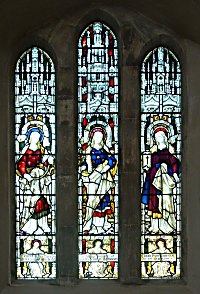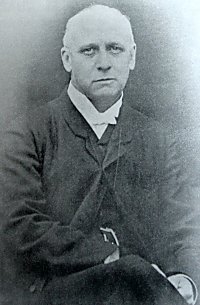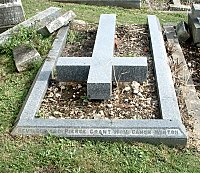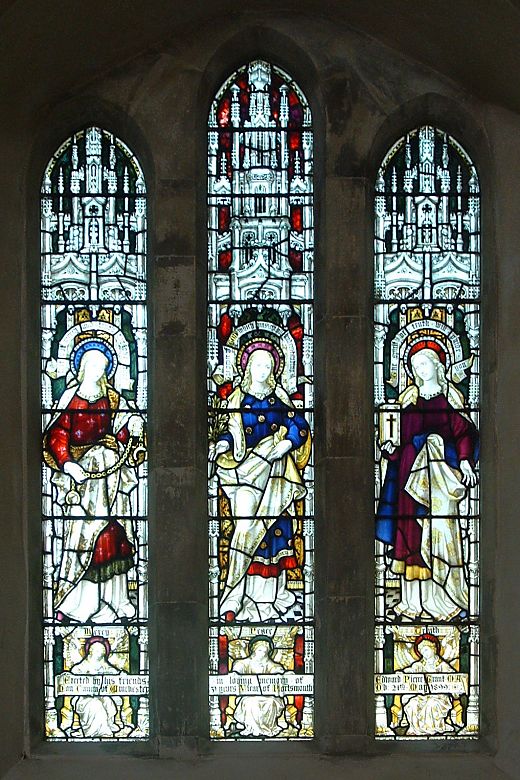Location
Window in the north wall of the Lady Chapel (see Cathedral Plan).
Hon. Canon of Winchester, 31 years Vicar of Portsmouth, Ob: 24th May 1899
Further Information
Edward Pierce Grant was born in 1834 of a well known Portsmouth family. His grandfather had been Clerk of the Cheque in the Dockyard, his uncle had been Chief Resident Officer of the Royal Clarence Victualling Yard and his father, Canon Robert Grant, having been educated at Portsmouth Grammar School, was to become the first vicar of St. Paul's church in Southsea. His mother came from the equally prominent Garrett family.
In 1868 Grant was called to St. Thomas's following a clerical career as curate and vicar of Bishop's Caundle in Dorset. He arrived at a time of great social unease to a town with a shifting population of soldiers and sailors who had little opportunity for recreation beyond the beerhouses and inns. The crushing poverty of Portsmouth and particularly Portsea were being addressed by the dramatic figure of Father Dolling at St. Agatha's, but Grant shied away from the publicity courted by Dolling, preferring instead to conduct his ministry quietly and personally. It was said that 'he was personally known in every house in his parish'.
His impression on the religious life of the community was not solely pastoral as he took great interest in the improvements to the structure of St. Thomas's, overseeing the replacement of the clock, the demolition of a wall at the east end of the church to allow for the widening of Golden Lion Lane (now Lombard Street), the rebuilding of the organ and the removal of plaster that revealed the clerestory. He was also the incumbent at the time that Nos. 94 and 95 High Street were demolished to allow the church to be viewed in full from the High Street for the first time in centuries.
Grant played an important role in the field of education, becoming a prime mover in the quest to establish a School of Science and Art. This in time became the Municipal College in Park Road, behind the Guildhall, which was eventually transformed into the University of Portsmouth. His interest though, was not confined to further education. When Gladstone's administration initiated the school boards, Grant was one of the first members to be elected. At the second meeting of the board he proposed that education should be made compulsory for children aged five to thirteen; the board accepted this by 13 votes to one. During his period in office he took an interest and active role in the promotion of both the Grammar School and the first Girls Public Day School.
Towards the end of the 19C Grant's health began to fail and though he continued to perform all the duties expected of a vicar it was plain that he was a sick man. A group of medical specialists examined him and recommended an operation which took place on Wednesday 24th May 1899. Grant did not survive the procedure. He was buried the following Saturday in Highland Road Cemetery [next to the Chapel] and was accompanied there by great crowds of mourners from all denominations. The tributes to Grant and his work flowed in and at a memorial service the following week the Vicar of St. Mary's, Cosmo Gordon Lang said that "Grant's position as a clergyman of the English Church should be judged not by the doctrines that he held....but by the life he lived and the good which he tried to do".
SOURCE:- "Forever Building" Chapter Five by Edward S. Washington.
POSTSCRIPT
Ross Lucas-Young has been in contact with us to point out that there is a record of the baptism of Edward Pierce Grant on 3rd November 1833 in the parish records of Bradford Abbas in Dorset. This evidence contradicts the date of birth given above and can be taken as accurate given that Edward's father, Robert Grant, was known to have been the vicar there at that time. His mother was Frances Mary (nee Garrett) Grant.
The Rev Robert Grant lived at 11 Clarendon Road, Southsea when it was first built in 1874 and died there on the 15th September 1887. He is buried at Bradford Abbas with his wife who died 22 May 1840 aged 33 and two of their sons, Robert George (died aged 2 years) and Augustus Martin (aged 11 years).




